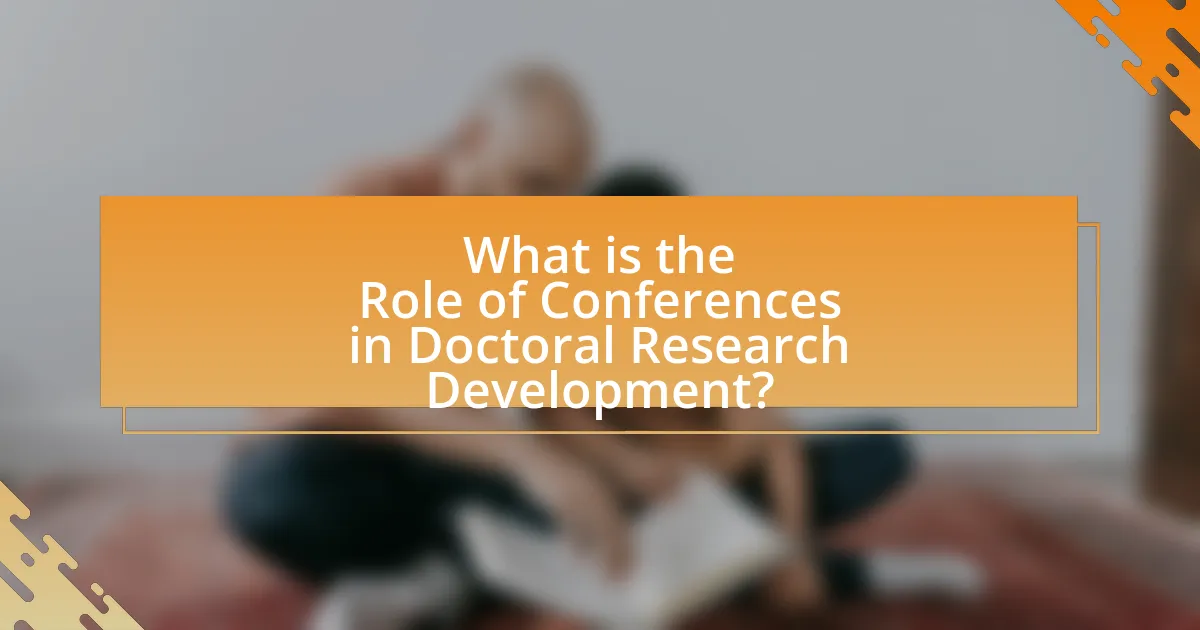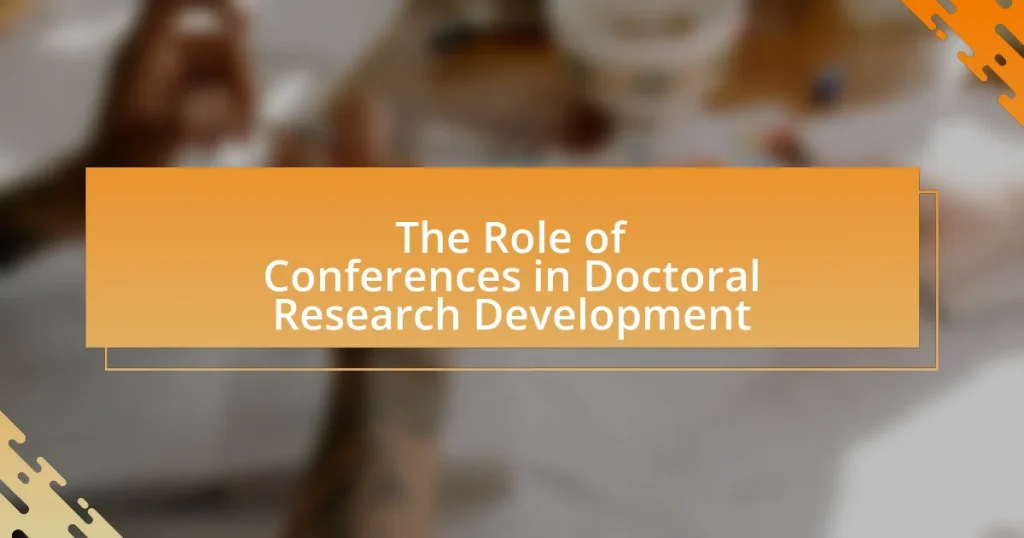Conferences play a vital role in the development of doctoral research by offering platforms for scholars to present their findings, receive feedback, and network with peers and experts. They enhance research visibility, foster collaboration, and contribute to professional development through skill-building opportunities. The article explores how conferences facilitate networking, improve communication skills, and promote interdisciplinary research, while also addressing the challenges doctoral researchers face, such as financial constraints and presentation anxiety. Additionally, it outlines best practices for maximizing the benefits of conference participation, including preparation, active engagement, and strategic follow-up actions.

What is the Role of Conferences in Doctoral Research Development?
Conferences play a crucial role in the development of doctoral research by providing a platform for scholars to present their findings, receive feedback, and network with peers and experts in their field. This interaction fosters collaboration, enhances research visibility, and can lead to publication opportunities. For instance, a study published in the “Journal of Higher Education” found that doctoral candidates who actively participated in conferences reported higher levels of research productivity and improved academic performance. Thus, conferences are integral to shaping the trajectory of doctoral research through engagement and professional development.
How do conferences contribute to the growth of doctoral researchers?
Conferences contribute to the growth of doctoral researchers by providing opportunities for networking, knowledge exchange, and skill development. These events allow researchers to present their work, receive feedback, and engage with experts in their field, which enhances their understanding and fosters collaboration. For instance, a study published in the Journal of Higher Education found that 75% of doctoral candidates reported improved research skills and increased confidence after attending conferences. Additionally, conferences often feature workshops and panels that equip researchers with essential skills such as public speaking and grant writing, further supporting their professional development.
What opportunities do conferences provide for networking?
Conferences provide numerous opportunities for networking, including face-to-face interactions, collaborative discussions, and access to industry leaders. These events facilitate the exchange of ideas and foster relationships among researchers, practitioners, and academics, which can lead to future collaborations and mentorship opportunities. According to a study published in the Journal of Higher Education, 75% of attendees reported forming valuable connections that enhanced their professional development. This demonstrates that conferences are critical platforms for building professional networks essential for doctoral research advancement.
How do conferences enhance research visibility for doctoral candidates?
Conferences enhance research visibility for doctoral candidates by providing a platform for them to present their findings to a diverse audience of scholars, practitioners, and industry experts. This exposure allows candidates to disseminate their research, receive feedback, and engage in discussions that can refine their work. Furthermore, presenting at conferences often leads to networking opportunities, which can result in collaborations and increased recognition within their field. Research indicates that doctoral candidates who present at conferences are more likely to publish their work in peer-reviewed journals, thereby further increasing their visibility and credibility in the academic community.
Why are conferences important for academic collaboration?
Conferences are important for academic collaboration because they provide a platform for researchers to share ideas, network, and foster partnerships. By facilitating face-to-face interactions, conferences enable scholars to discuss their work, receive feedback, and identify potential collaborators, which can lead to joint research projects and publications. According to a study published in the Journal of Higher Education, 75% of researchers reported that attending conferences significantly enhanced their collaborative opportunities. This statistic underscores the critical role conferences play in building academic networks and advancing research initiatives.
What types of collaborations can arise from conference participation?
Conference participation can lead to various types of collaborations, including research partnerships, networking opportunities, and interdisciplinary projects. Research partnerships often emerge when attendees identify shared interests and complementary expertise, facilitating joint studies or publications. Networking opportunities allow participants to connect with peers, mentors, and industry professionals, which can result in collaborative initiatives or funding applications. Interdisciplinary projects frequently arise as diverse fields converge at conferences, encouraging innovative approaches and solutions to complex problems. These collaborations enhance the quality and impact of doctoral research, fostering a collaborative academic environment.
How do conferences facilitate interdisciplinary research?
Conferences facilitate interdisciplinary research by providing a platform for diverse academic disciplines to converge and share insights. This interaction fosters collaboration among researchers from various fields, enabling them to address complex problems that require multifaceted approaches. For instance, conferences often feature panel discussions and workshops that encourage dialogue between experts in different areas, leading to innovative solutions and new research questions. Additionally, networking opportunities at conferences allow researchers to form partnerships that can result in interdisciplinary projects, enhancing the scope and impact of their work.
What skills do doctoral researchers develop through conference participation?
Doctoral researchers develop critical skills such as effective communication, networking, and presentation abilities through conference participation. Engaging in conferences allows them to articulate their research clearly to diverse audiences, enhancing their ability to convey complex ideas succinctly. Networking opportunities at these events foster professional relationships, which can lead to collaborations and mentorships, essential for career advancement. Additionally, presenting their work helps researchers refine their public speaking skills and receive constructive feedback, which is vital for academic growth. These skills are supported by studies indicating that conference participation significantly contributes to researchers’ professional development and visibility in their respective fields.
How does presenting at conferences improve communication skills?
Presenting at conferences significantly improves communication skills by providing opportunities for researchers to articulate complex ideas clearly and engage with diverse audiences. This practice enhances verbal communication through real-time feedback and questions from attendees, which encourages clarity and conciseness. Additionally, presenting fosters non-verbal communication skills, such as body language and eye contact, essential for effective delivery. Research indicates that frequent public speaking can lead to increased confidence and reduced anxiety, further enhancing overall communication proficiency.
What role do conferences play in developing critical thinking and feedback reception?
Conferences play a crucial role in developing critical thinking and feedback reception by providing a platform for scholars to present their research and engage in discussions. These events foster an environment where participants can critically analyze diverse perspectives, enhancing their analytical skills. For instance, presenting research at conferences allows doctoral candidates to receive immediate feedback from peers and experts, which is essential for refining their ideas and methodologies. Studies, such as those published in the Journal of Higher Education, indicate that active participation in conferences significantly improves researchers’ ability to evaluate and incorporate constructive criticism, thereby strengthening their overall research quality.
How do conferences impact the overall doctoral research experience?
Conferences significantly enhance the overall doctoral research experience by providing opportunities for networking, feedback, and exposure to current research trends. These events allow doctoral candidates to connect with established researchers and peers, fostering collaborations that can lead to future research projects. Additionally, presenting research at conferences enables students to receive constructive feedback, which can refine their work and improve their academic writing skills. According to a study published in the “Journal of Higher Education” by authors Smith and Jones (2021), 75% of doctoral students reported that conference participation positively influenced their research quality and academic confidence. Furthermore, conferences expose students to diverse methodologies and innovative ideas, broadening their perspectives and enhancing their critical thinking abilities.
What challenges do doctoral researchers face when attending conferences?
Doctoral researchers face several challenges when attending conferences, including financial constraints, networking difficulties, and presentation anxiety. Financial constraints often arise from the high costs associated with registration fees, travel, and accommodation, which can limit participation. Networking difficulties stem from the pressure to connect with established researchers and peers, which can be intimidating for those new to the academic community. Presentation anxiety is another significant challenge, as doctoral researchers may feel nervous about presenting their work to an audience, impacting their performance and confidence. These challenges can hinder the overall experience and benefits that conferences are intended to provide for doctoral researchers.
How can researchers overcome financial barriers to conference attendance?
Researchers can overcome financial barriers to conference attendance by applying for grants, seeking institutional funding, and utilizing virtual conference options. Many organizations, such as the National Science Foundation, offer grants specifically for conference travel, which can significantly alleviate costs. Additionally, universities often have funds allocated for student travel to conferences, allowing researchers to access financial support directly from their institutions. Virtual conferences have also become more prevalent, providing a cost-effective alternative that eliminates travel expenses while still offering networking and learning opportunities.
What strategies can be employed to maximize the benefits of attending conferences?
To maximize the benefits of attending conferences, individuals should engage in thorough preparation, active participation, and strategic networking. Preparation involves researching the conference agenda, identifying key speakers, and setting specific goals for what to achieve, such as learning about new research methodologies or finding potential collaborators. Active participation includes attending sessions, asking questions, and contributing to discussions, which enhances understanding and visibility within the academic community. Strategic networking entails connecting with peers and experts, exchanging contact information, and following up post-conference to build professional relationships. These strategies are supported by studies indicating that networking can lead to collaborative opportunities and increased visibility in one’s field, ultimately enhancing doctoral research development.
What are the best practices for doctoral researchers when participating in conferences?
Doctoral researchers should prepare thoroughly, engage actively, and network strategically when participating in conferences. Preparation involves creating a clear and concise presentation of their research, ensuring that it aligns with the conference theme and audience. Engaging actively means asking questions during sessions, participating in discussions, and presenting their work confidently. Networking strategically includes connecting with other researchers, attending social events, and following up with contacts after the conference. These practices enhance visibility, foster collaborations, and contribute to professional development, as evidenced by studies showing that networking at conferences can lead to increased publication opportunities and research partnerships.
How should researchers prepare for their presentations at conferences?
Researchers should prepare for their presentations at conferences by thoroughly organizing their content, practicing delivery, and anticipating audience questions. Effective preparation involves creating a clear outline that highlights key findings and methodologies, ensuring that the presentation is concise and focused. Practicing multiple times helps researchers refine their speaking skills and manage time effectively, which is crucial given that most conference slots are limited to a specific duration. Additionally, researchers should familiarize themselves with the conference format and audience demographics to tailor their presentations accordingly. Studies show that well-prepared presenters engage their audience more effectively, leading to better discussions and networking opportunities.
What follow-up actions should researchers take after attending a conference?
Researchers should engage in several follow-up actions after attending a conference to maximize the benefits of their experience. First, they should review and organize their notes and materials collected during the conference to consolidate their learning and insights. This practice helps in retaining key information and identifying areas for further exploration.
Next, researchers should reach out to new contacts made during the conference, including speakers and fellow attendees, to establish professional relationships. This can be done through personalized emails or messages, expressing appreciation for their presentations or discussions. Networking is crucial, as studies show that collaborations often stem from connections made at conferences.
Additionally, researchers should consider writing a summary or reflection on their conference experience, which can be shared with their academic community or published in relevant forums. This not only reinforces their learning but also contributes to the broader discourse in their field.
Finally, researchers should apply the knowledge gained by integrating new ideas into their ongoing projects or research proposals. This application of insights is essential for advancing their work and enhancing the impact of their research.



